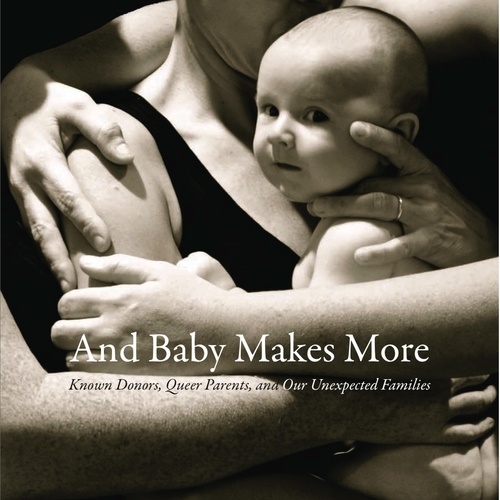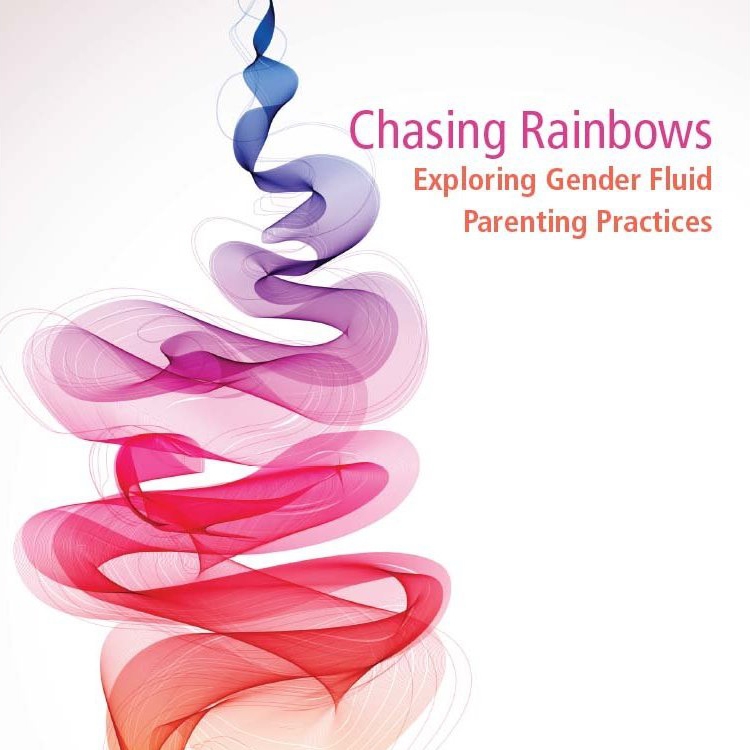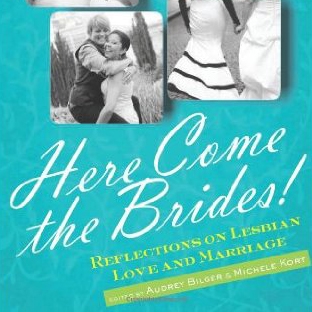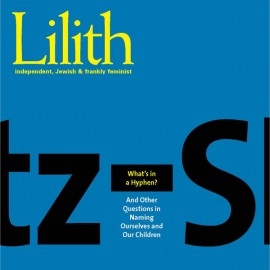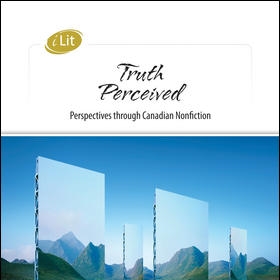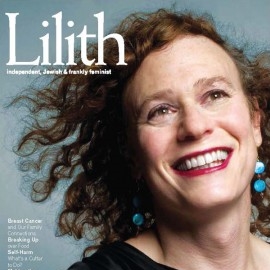Creative writing
Book: And Baby Makes More
I am coeditor, with the lovely Chloe Brushwood Rose, of the anthology And Baby Makes More: Known Donors, Queer Parents and Our Unexpected Families, published by Insomniac Press in 2009. Check it out — especially if you or some queers you know are considering making a baby and wondering where to get the goods. Or if you’ve been asked to donate said goods. You can read the introduction and first chapter here.
Overflow
Overflow is an award-winning multimedia storytelling/performance piece that explores the subjects of body image, hereditary breast cancer and mother-daughter relationships, through the lens of our so-called "intimates": the garments we wear closest to our skin. How are our ideas about our bodies and our breasts shaped by maternal influence? What if that maternal influence includes a genetic predisposition to breast cancer? What stories do our bras (yes, our bras) tell about our lives?
Overflow is the story of what happens when one woman goes on an unprecedented bra-buying spree one week in February. Eight bras (and as many hundreds of dollars) later, she finds herself with a drawer full of new lingerie — and a crippling inability to rid herself of the worn out, ill fitting, and decidedly unsexy underwear she's held onto for years. The result is a performance piece that — literally and figuratively — strips things down to the skin to explore some intimate questions about what, exactly, we inherit from our mothers and how we make sense of that inheritance.
I received a grant from The Ontario Arts Council to develop the piece for stage, and I am currently planning to perform it in October 2014. Details to come.
Essays
“Palindrome," at Friendship at Midlife: Ten Women Share Their Stories, HerStories
Are the woods big enough, though, for how angry I am? At how nature tricked both of us, but betrayed her while sparing me? At myself, for continually inserting myself into a story that is no longer mine, never was? At her father for his crimes, at the president and the administration of this country we have crossed into, at every single predator who has targeted someone smaller, weaker, less powerful, more in need? At the ways in which those predators take up so much space, eating into our bedrooms, our narratives, our very cells, and how it feels like the only defence too much of the time is to cut off and poison the parts of ourselves they’ve touched, hope we live to tell the tale, hope that the cycle isn’t repeated, mirror image, in our daughters’ and our granddaughters’ lives?
“Fountain of Youth,” at Catapult
My stepmother is phoning Boca Raton bagel stores from the front seat of the car.
“Hello,” she says, enunciating mightily into a bagel answering service, as we cruise along the Florida Turnpike. “I’m calling to find out if you have small bagels. I think they’re called ‘mini bagels’? Do you make those?” She leaves her phone number, with instructions to call her back.
My father and stepmother are hosting a brunch, in their new Florida condo complex, for all their friends from their old Florida condo complex. Egg and tuna, lox and cream cheese, salads, plenty of vegan options. (She and my dad became vegan four years ago, overnight, after watching a documentary on heart disease. Neither of them, thank God, has heart disease.) But they need to buy the bagels. And the bagels, apparently, have to be small.
“Wait, and hurry up,” at Manifest Station
Can we really prepare for the passage of time? More specifically, can we really prepare for the number it does on our bodies? questions. You don’t really prepare for decline. You confront it, the way you confront grief, in stages: At first you deny its possibility, and then you ignore its symptoms, and then you rail against it, compensate subtly for it, think you can overcome it. Finally, with more or less grace, you get used to it, incorporate it into your daily life. The curve flattens out, becomes the new straight line. Until you’re hit with the next curveball.
“Titanic,” at Full Grown People
Rachel and I told the kids that we were separating on a Saturday night—also known in our then-household as Family Movie Night. Family Movie Night was pretty much exactly what it sounds like: we each took turns picking a film, and then the four of us hunkered down with pizza and popcorn in the basement and watched it together.
Family Movie Night was about as democratic as it gets, which means that if I had to sit through Soccer Dog: European Cup and suffer the unrelenting vulgarity (and grudging hilarity) of Dumb and Dumber, then in turn my sons had to put up with my fondness for classics like Annie, School of Rock, and Beetlejuice, and with Rachel’s fascinating but maybe slightly off-base pick of Beasts of the Southern Wild. [...]
On this particular Saturday evening, our seven-year-old son got to choose what we’d be watching for Family Movie Night.
“He wants Titanic,” Rachel texted me that morning. “It’s a metaphor.”
“I’ll miss your gallows sense of humor,” I wrote back. It was true.
“Am I bullied by the past? Or just by my memories?” at TueNight
Toward the end of [Grade 8], an anonymous, handwritten note appeared in my art folder. The letter, written in a half-dozen or so different colors of ink and scripts, served to list my many and varied faults (I was conceited; I wore too much eyeliner), and to let me know that everyone in the class hated me.
Today, I remember what the letter looked like, but only a few, specific, scraps of what it actually said (“You should be shot and pissed on, and not in that order”; “Everyone is in on this”; and, on the outside of the note, “SWAB: Sealed with a Booger”). I remember huddling in the bathroom with my closest friend, a girl similarly on the outskirts, letting her read it. I remember crying in my bedroom later that evening, and also watching myself cry in the mirror, noting the way my excessive eyeliner smudged around my eyes in a little mask of grief, acting out my misery and helplessness for an audience of one. Later that evening, I burned the note in my backyard. You could do that then, when hate letters were still written on paper.
“Mamas’ babies, papa’s maybe?” In And Baby Makes More: Known Donors, Queer Parents and Our Unexpected Families.
It’s not that we’re embarrassed or ashamed about the situation. It’s not even that we’re scared of the responses we might get. Before we moved from the big city to the small Canadian town we now call home, I worried that the spectre of a two-mom (plus amorphous-but-possibly-gay male friend figure) family might be too much for the locals to handle. But they’ve all been great — have barely batted an eye. It’s just that it’s taken us a while to come up with an easy way to describe the situation in those blink-of-an-eye, waiting-in-line-at-the-pharmacy encounters. And so we stammer and nod and smile, stumbling along to the steps of the parental dance of recognition, searching for a language that somehow describes three (albeit unequal) partners instead of the assumed two.
“A version of upright.” Stealing Time magazine. Spring 2013.
We’re not the only ones who do this, are we? Not the only ones who storyboard the deaths of our loved ones while we make dinner, take out the garbage, run the evening bathwater? It could happen at any time, we imagine, and so we’d best think it through, so as not to be completely unprepared.
“Four (same-sex, half-Jewish) weddings and a funeral.”
This essay was originally printed in Lilith magazine (Winter 2009-10), and then republished in the anthology Here Come the Brides! Reflections on Lesbian Love and Marriage, and excerpted in Ms. Magazine (Winter 2012).
We all saw the third wedding coming, but we hesitated. Binally, my mother said out loud the words no one else had been able to say. She’d spent the night at the hospital in respiratory distress; the doctors had drained two liters of fluid from around her right lung, the one that didn’t have a catheter in it already. We had an appointment with the palliative care doctor the next morning.
“Susan,” she said, “I don’t think I’m going to make it to June 13.”
“We’ll change the date,” I said. “We’ll do it sooner.”
She nodded. My father just looked into his lap as he sat next to her on the couch. I didn’t cry until I phoned the rabbi to reschedule.
“The boy in the red dress.” In Chasing Rainbows: Exploring Gender Fluid Parenting Practices. Demeter Press, 2013.
Underneath his hoodie, tucked into the hem of his sweatpants, is a dress — the dress. Peel back the layers and you’ll see it: bright red cotton; long sleeves; a luminous white heart silkscreened on the centre of its chest. His chest. He wore it all weekend, slept in it, wore it to his babysitter’s house on Monday, will not let us launder it. He has tucked the dress — or, more precisely, I have tucked the dress — into the hem of his sweatpants, ostensibly in order to put on his outerwear. I haven’t helped him untuck it. […]
I have put a shirt — a long-sleeved, red-and-blue striped shirt — in Rowan’s backpack, just in case. Just in case, I tell him, he decides he’d be more comfortable in it and would like to change. I have shown him what I term a “trick”: if he’d like to wear his dress privately, just for himself, he can tuck it into his sweatpants, zip up his hoodie over it. But he does not want to change, does not want to keep his dress private, covered up, and even as I suggest these things, hoping he goes for them, I feel cheapened. […]
And I kiss him goodbye and tell him I love him, leave him, turning back as I walk toward the school doors to watch him: a four-year-old boy whose black sweatpants and blue hooded sweatshirt still hide the heart he wears on his chest. He stands still as a current of children moves around him, one hand fingering the zipper on his sweatshirt. I can’t quite tell whether I will feel worse if he keeps it on or takes it off.
I’m proud of him, yes.
But am I proud of me?
“It’s always something.” In The BlogHer Voices of the Year Anthology, Open Road Media, 2013.
How do you explain to [a four-year-old] that his impulse to give, to want to do something, is precisely right — and yet, that doesn’t mean that he can take the two silver boxes off Rachel’s dresser and give them away? I mean, it sounds so petty, so selfish of me to say no (what kind of a douchebag are you? She’s dying.): of course I would hand them and more over in a heartbeat if it would make any difference, but it won’t and you can’t really give other people’s things away… the explanation, the logic of it, fizzle away in the face of the situation, my explanations as ridiculous as his questions: Can we put the money on her gravestone? (She’s not dead yet, Isaac, I want to say, but) No, we don’t put money on gravestones. Why? Well, because we…Well, then we can scatter it in the grass. Oh sweetie, that won’t help our friend. But let’s find sparkly rocks when the time comes. When the time is right, we’ll take some of the money from our house and give it in our friend’s honour to a place that will help to make sure that no one else…
And then, I can finish the sentence.
“Friend me?” In Truth Perceived: Perspectives through Canadian Nonfiction, McGraw-Hill Ryerson, 2012:4-10.
Dear Alisa Weisman Edelstein,
Thank you for your recent “friend request” on Facebook. Thanks for the kind note, your compliments on my hair, the congratulations on my new baby. You look good, too. I see you’re married now. Your kids are cute — two boys? Wow, me too. Yes, it’s been a while — not sure when we last spoke, but that’s the great thing about Facebook, isn’t it? It can magically wipe out the two decades-plus between today and eighth grade. Suddenly I can be right back in homeroom with a stomachache, searching for a friendly table in the cafeteria, hiding out in the library every lunchtime.
Hoping not to run into you.
“Que(e)ying the Matrilineal Principle.” Lilith magazine, Winter 2011–2012.
I remember clearly the day that my religious studies teacher, Rabbi Meyerovitch, explained to us — a group of seventh-grade girls at the private Jewish elementary school I attended in Vancouver, British Columbia — the rabbinic law that determined who got to be “born Jewish.”
He was about as direct as one might expect a grizzled, 60-something orthodox man to be about such matters, but he tried his best. A child follows the religion of the mother, he explained, because — and here he coughed — “well ... you can always be sure of who the mother is.”
We looked at him blankly.
He continued: “But ... you can’t always be sure of the father.”
It took me a few minutes, but I caught on eventually. At the time, the rabbinical logic made perfect sense to my 12-year-old mind: if any poor shmuck fingered by the mother could conceivably be the father, then of course the baby should follow the religion of the “knowable” parent, the parent to whose body it was irrefutably, undeniably tethered. Fatherhood as a concept was murky, shifting. But motherhood? You could count on that. You could see it with the naked eye.
“Small Town Jew Blues,” at InterfaithFamily.com
I've written several articles for this organization devoted to Jewish/non-Jewish interfaith families.
As my older son prepared for junior kindergarten, my partner and I consulted our lesbian parenting books and dutifully made an appointment with his teacher to discuss the fact that Rowan Has Two Mommies.
We weren't sure what to expect. We live in Thunder Bay, Ontario, a city of approximately 115,000 people on the north shore of Lake Superior. It's the biggest thing going in northern Ontario, but it feels like a small place to us. […]
[The talk] went swimmingly. [The teacher] asked all the right questions, didn't ask any of the wrong ones, and seemed open and welcoming. "Oh yeah," she said, "I had a little girl last year who had two daddies."
As we started to wrap up the conversation, I mentioned in passing that Rowan was Jewish, and that it would be important to ensure that his culture and religious traditions were reflected in the curriculum.
His teacher paused. "Oh," she said. "Well, I'm definitely going to need some help with that."
In Thunder Bay, it appears, being queer, even being a queer parent, is no big deal. But being Jewish? People aren't so prepared for that.
Radio
In 2006, my radio documentary, “Finding out” — about my decision to be tested for the genetic mutation responsible for my mother’s cancer — aired on the CBC. You can listen to it here.
— Susan Flynn, Canadian Cancer Society, Ontario Division —


